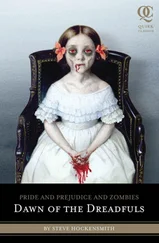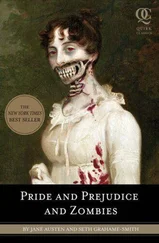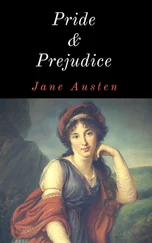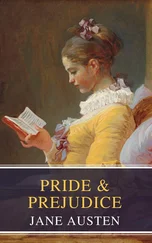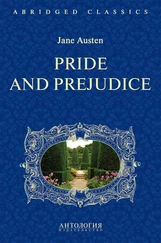Jane Austin - Pride and Prejudice
Здесь есть возможность читать онлайн «Jane Austin - Pride and Prejudice» — ознакомительный отрывок электронной книги совершенно бесплатно, а после прочтения отрывка купить полную версию. В некоторых случаях можно слушать аудио, скачать через торрент в формате fb2 и присутствует краткое содержание. Жанр: unrecognised, на немецком языке. Описание произведения, (предисловие) а так же отзывы посетителей доступны на портале библиотеки ЛибКат.
- Название:Pride and Prejudice
- Автор:
- Жанр:
- Год:неизвестен
- ISBN:нет данных
- Рейтинг книги:3 / 5. Голосов: 1
-
Избранное:Добавить в избранное
- Отзывы:
-
Ваша оценка:
- 60
- 1
- 2
- 3
- 4
- 5
Pride and Prejudice: краткое содержание, описание и аннотация
Предлагаем к чтению аннотацию, описание, краткое содержание или предисловие (зависит от того, что написал сам автор книги «Pride and Prejudice»). Если вы не нашли необходимую информацию о книге — напишите в комментариях, мы постараемся отыскать её.
Pride and Prejudice — читать онлайн ознакомительный отрывок
Ниже представлен текст книги, разбитый по страницам. Система сохранения места последней прочитанной страницы, позволяет с удобством читать онлайн бесплатно книгу «Pride and Prejudice», без необходимости каждый раз заново искать на чём Вы остановились. Поставьте закладку, и сможете в любой момент перейти на страницу, на которой закончили чтение.
Интервал:
Закладка:
that head, as you will hear.”
“Hunsford, near Westerham, Kent, 15_th October_.
“Dear Sir,—
“The disagreement subsisting between yourself and my late
honoured father always gave me much uneasiness, and since I have
had the misfortune to lose him, I have frequently wished to heal
the breach; but for some time I was kept back by my own doubts,
fearing lest it might seem disrespectful to his memory for me to
be on good terms with anyone with whom it had always pleased him
to be at variance.—‘There, Mrs. Bennet.’—My mind, however, is now
made up on the subject, for having received ordination at Easter,
I have been so fortunate as to be distinguished by the patronage
of the Right Honourable Lady Catherine de Bourgh, widow of Sir
Lewis de Bourgh, whose bounty and beneficence has preferred me to
the valuable rectory of this parish, where it shall be my earnest
endeavour to demean myself with grateful respect towards her
ladyship, and be ever ready to perform those rites and ceremonies
which are instituted by the Church of England. As a clergyman,
moreover, I feel it my duty to promote and establish the blessing
of peace in all families within the reach of my influence; and on
these grounds I flatter myself that my present overtures are
highly commendable, and that the circumstance of my being next in
the entail of Longbourn estate will be kindly overlooked on your
side, and not lead you to reject the offered olive-branch. I
cannot be otherwise than concerned at being the means of injuring
your amiable daughters, and beg leave to apologise for it, as
well as to assure you of my readiness to make them every possible
amends—but of this hereafter. If you should have no objection to
receive me into your house, I propose myself the satisfaction of
waiting on you and your family, Monday, November 18th, by four
o’clock, and shall probably trespass on your hospitality till the
Saturday se’ennight following, which I can do without any
inconvenience, as Lady Catherine is far from objecting to my
occasional absence on a Sunday, provided that some other
clergyman is engaged to do the duty of the day.—I remain, dear
sir, with respectful compliments to your lady and daughters, your
well-wisher and friend,
“WILLIAM COLLINS”
“At four o’clock, therefore, we may expect this peace-making
gentleman,” said Mr. Bennet, as he folded up the letter. “He
seems to be a most conscientious and polite young man, upon my
word, and I doubt not will prove a valuable acquaintance,
especially if Lady Catherine should be so indulgent as to let him
come to us again.”
“There is some sense in what he says about the girls, however,
and if he is disposed to make them any amends, I shall not be the
person to discourage him.”
“Though it is difficult,” said Jane, “to guess in what way he can
mean to make us the atonement he thinks our due, the wish is
certainly to his credit.”
Elizabeth was chiefly struck by his extraordinary deference for
Lady Catherine, and his kind intention of christening, marrying,
and burying his parishioners whenever it were required.
“He must be an oddity, I think,” said she. “I cannot make him
out.—There is something very pompous in his style.—And what can
he mean by apologising for being next in the entail?—We cannot
suppose he would help it if he could.—Could he be a sensible man,
sir?”
“No, my dear, I think not. I have great hopes of finding him
quite the reverse. There is a mixture of servility and
self-importance in his letter, which promises well. I am
impatient to see him.”
“In point of composition,” said Mary, “the letter does not seem
defective. The idea of the olive-branch perhaps is not wholly
new, yet I think it is well expressed.”
To Catherine and Lydia, neither the letter nor its writer were in
any degree interesting. It was next to impossible that their
cousin should come in a scarlet coat, and it was now some weeks
since they had received pleasure from the society of a man in any
other colour. As for their mother, Mr. Collins’s letter had done
away much of her ill-will, and she was preparing to see him with
a degree of composure which astonished her husband and daughters.
Mr. Collins was punctual to his time, and was received with great
politeness by the whole family. Mr. Bennet indeed said little;
but the ladies were ready enough to talk, and Mr. Collins seemed
neither in need of encouragement, nor inclined to be silent
himself. He was a tall, heavy-looking young man of
five-and-twenty. His air was grave and stately, and his manners
were very formal. He had not been long seated before he
complimented Mrs. Bennet on having so fine a family of daughters;
said he had heard much of their beauty, but that in this instance
fame had fallen short of the truth; and added, that he did not
doubt her seeing them all in due time disposed of in marriage.
This gallantry was not much to the taste of some of his hearers;
but Mrs. Bennet, who quarreled with no compliments, answered most
readily.
“You are very kind, I am sure; and I wish with all my heart it
may prove so, for else they will be destitute enough. Things are
settled so oddly.”
“You allude, perhaps, to the entail of this estate.”
“Ah! sir, I do indeed. It is a grievous affair to my poor girls,
you must confess. Not that I mean to find fault with _you_, for
such things I know are all chance in this world. There is no
knowing how estates will go when once they come to be entailed.”
“I am very sensible, madam, of the hardship to my fair cousins,
and could say much on the subject, but that I am cautious of
appearing forward and precipitate. But I can assure the young
ladies that I come prepared to admire them. At present I will not
say more; but, perhaps, when we are better acquainted—”
He was interrupted by a summons to dinner; and the girls smiled
on each other. They were not the only objects of Mr. Collins’s
admiration. The hall, the dining-room, and all its furniture,
were examined and praised; and his commendation of everything
would have touched Mrs. Bennet’s heart, but for the mortifying
supposition of his viewing it all as his own future property. The
dinner too in its turn was highly admired; and he begged to know
to which of his fair cousins the excellency of its cooking was
owing. But he was set right there by Mrs. Bennet, who assured him
with some asperity that they were very well able to keep a good
cook, and that her daughters had nothing to do in the kitchen. He
begged pardon for having displeased her. In a softened tone she
declared herself not at all offended; but he continued to
apologise for about a quarter of an hour.
Chapter 14
During dinner, Mr. Bennet scarcely spoke at all; but when the
servants were withdrawn, he thought it time to have some
conversation with his guest, and therefore started a subject in
which he expected him to shine, by observing that he seemed very
fortunate in his patroness. Lady Catherine de Bourgh’s attention
to his wishes, and consideration for his comfort, appeared very
remarkable. Mr. Bennet could not have chosen better. Mr. Collins
was eloquent in her praise. The subject elevated him to more than
usual solemnity of manner, and with a most important aspect he
Читать дальшеИнтервал:
Закладка:
Похожие книги на «Pride and Prejudice»
Представляем Вашему вниманию похожие книги на «Pride and Prejudice» списком для выбора. Мы отобрали схожую по названию и смыслу литературу в надежде предоставить читателям больше вариантов отыскать новые, интересные, ещё непрочитанные произведения.
Обсуждение, отзывы о книге «Pride and Prejudice» и просто собственные мнения читателей. Оставьте ваши комментарии, напишите, что Вы думаете о произведении, его смысле или главных героях. Укажите что конкретно понравилось, а что нет, и почему Вы так считаете.


